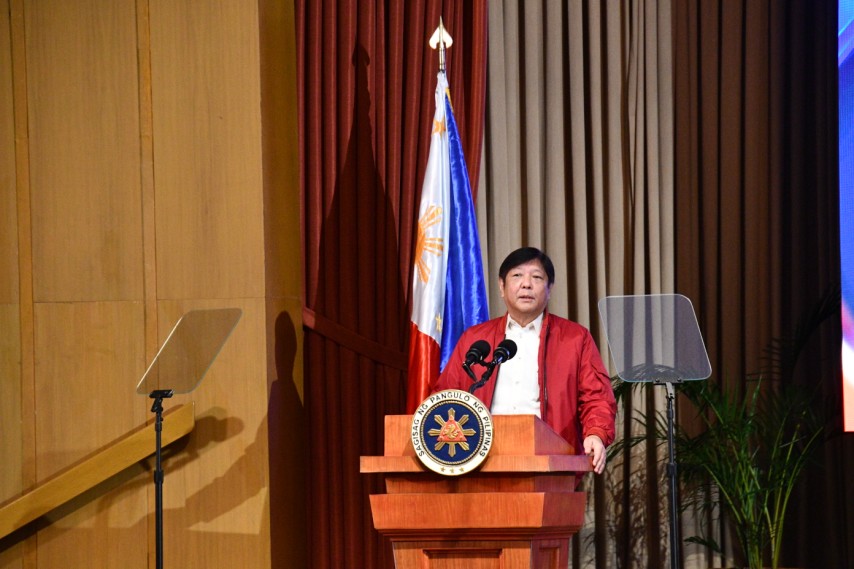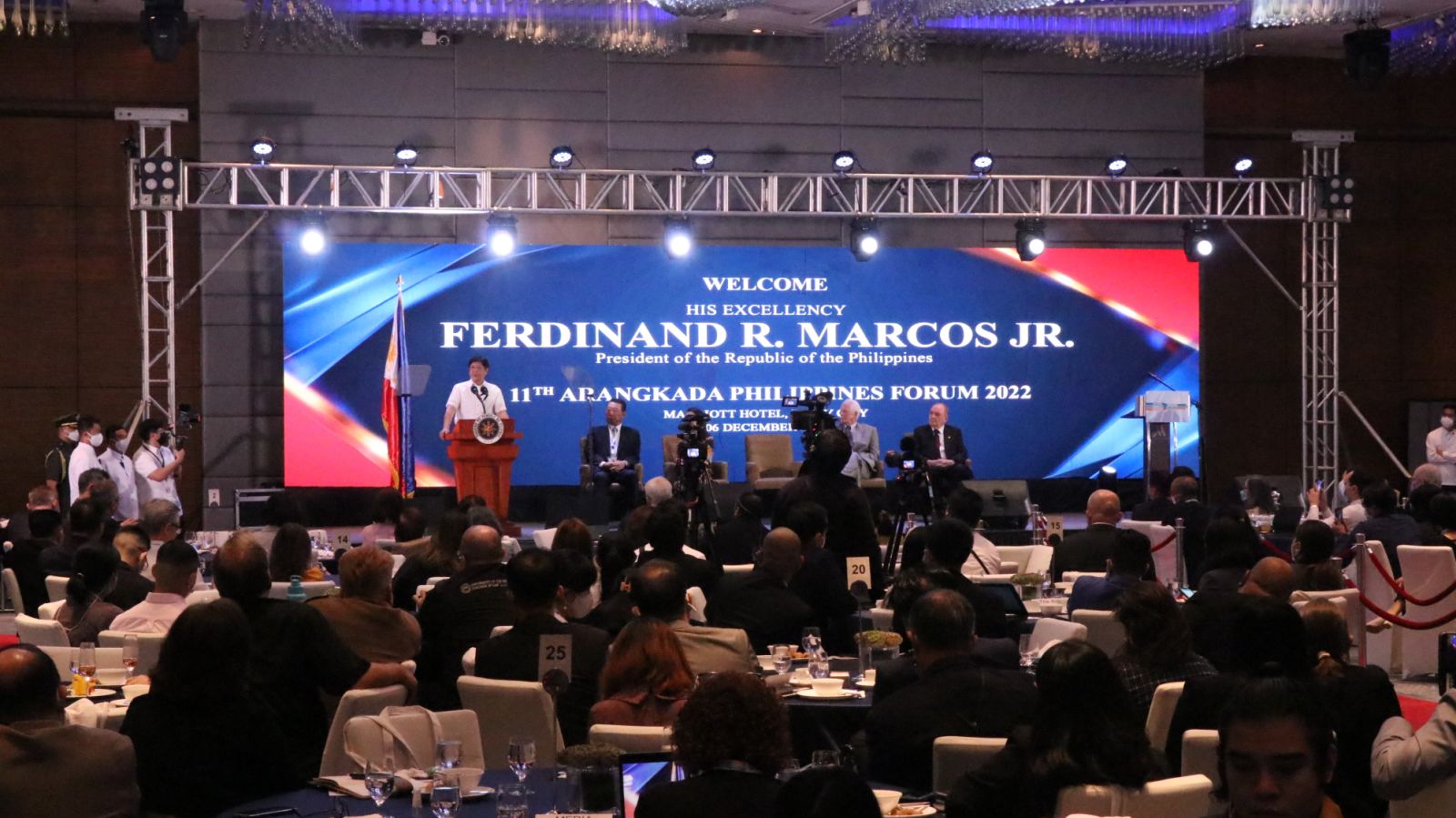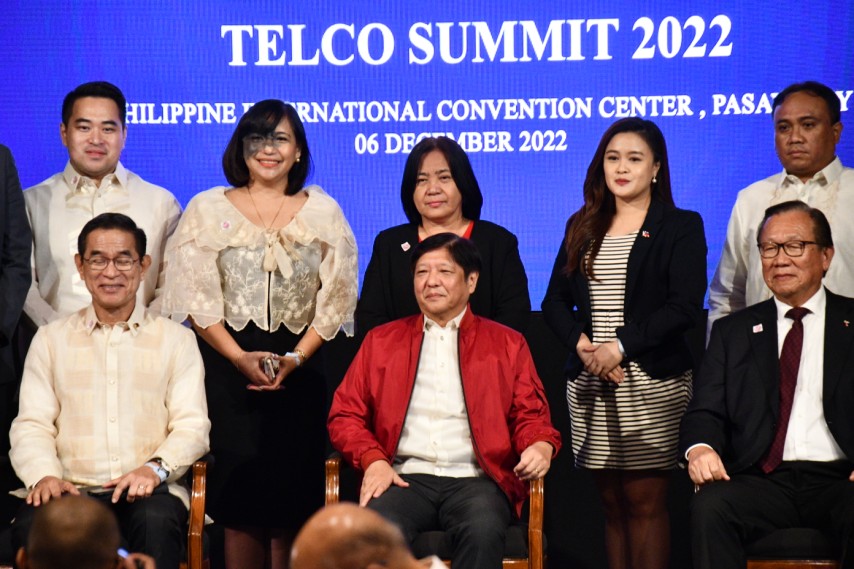Thank you very much for that rousing introduction.
I’d like to greet Her Excellency, the US Ambassador to the Philippines, Her Excellency MaryKay Carlson; the heads of the Joint Foreign Chambers of the Philippines; my fellow workers in government; the distinguished guests; ladies and gentlemen, good afternoon, magandang hapon po sa inyong lahat.
I would like first of all to ask that you extend to John our congratulations for this award that he has richly --- that he richly deserves for all the service that he has done, not only for the business, for American business interest in the Philippines but for all the economic activity that he has initiated by his hand, had initiated here in the Philippines to the benefit of the Philippine economy.
And it was --- I was very sad to hear that he is unwell but please extend to him, say that our thoughts and our prayers are with him and we hope you will be feeling better soon. [applause]
At the outset, allow me to congratulate the Joint Foreign Chambers of the Philippines for the successful conduct of this 11th Anniversary Forum, entitled “Arangkada Philippines: Reform, Rebuild, Recover.”
It is truly commendable that you have created a platform that encourages open dialogue and collaborative engagement amongst business persons, industry experts, investors, diplomats, and government officials.
It is likewise encouraging to see your willingness to work together with the government towards addressing these challenges so that we can further accelerate our country’s inclusive growth and economic momentum.
I can say that it is particularly important to this administration as when it comes to the economy, I think one of the main centerpieces in policy changes that we have made is the openness towards PPPs, towards joint ventures, towards more G2G partnerships and the central role that we see that the business sector, the private sector will play in the next few years for the development of the country.
And certainly, we are always looking especially in the Philippines because we still have a imbalance shall we say in terms of contributions to the GDP. It’s very highly skewed towards the --- to services and so we would like to build up manufacturing. And the manufacturing sector…
I think with 107 million Filipinos, it is a sufficient market to develop. We always talk about import substitution. And we try to favor those industries that are export-oriented and that’s valid. But I think it is also time to look inwards into the domestic market here and develop our manufacturing capabilities. Develop those markets, the local markets, and for that, we need the private sector to come in.
As when we talk about manufacturing, we are talking about capital intensive investments. And that is something we are hoping will be again a driver for our economy in the next few years.
On our part in the government, we have listened to the chambers of commerce. About what are the difficulties that you have been facing. And I think that we can enumerate them very quickly. The ease of doing business, number one.
I just came from ARTA, the Anti-Red Tape Authority. And they are working very, very hard to make the ease of doing business in the Philippines a much better situation. We have improved but we have ways to go for that. We talked about digitalization and how important that is going to be to improve the ease of doing business.
A more ticklish problem is that of energy which is another one that keeps coming up and especially with the volatility in the markets now especially when it comes to fuel that is become an even more severe problem than it used to be. But we are working on it. But this long-term, it is a long-term program in terms of supply producing more energy, especially in the midst of our commitments to the international community to move the mix from traditional fossil fuels to renewables.
Again, even the renewables take time, all the powerplant takes six, seven years to build but we will begin with. And I’m not concerned whether or not they will come online in my term, but I think that whenever they come online, we have to start now.
And that has been upon the urging, partially, certainly upon the urging of the Joint Chambers and to realize that this problem is holding is back when it comes to FDI, when it comes to even local investment.
So we have tried to create a partnership, closer partnership with the different chambers of commerce because once again, we, I consider the participation of the private sector in the --- as we reclaim our economic position in the world, I consider the participation of the private sector both local and foreign to be absolutely to our success. So that is why we must continue this partnership between the chambers of commerce, the private sector, and government.
The insights that you share in this forum will be helpful in opening new economic opportunities, revitalizing the sectors that have been most affected by the pandemic and certainly the challenges that came after. And for this, I thank you.
I’m glad that we gather here today to take stock of the concerns and opportunities for foreign businesses in this country; to address the challenges, the prospects through policies and programs and reforms; and ensure that everything that we do will be to the benefit of both the business sector and the general population.
In the beginning of my term, I have launched our Medium-Term Fiscal Framework and the Eight-Point Socioeconomic Agenda which is designed to ensure the full recovery and transformation of Philippine society.
The most pressing of these, at this point in time, will be first, ensuring food security; second, reducing transport and logistics costs; and third, lessening energy costs.
In these endeavors, we will need the help of foreign governments, of private partners who will bring in much-needed investments in modern and efficient farming and fisheries; new transport and logistics infrastructure; as well as new projects in conventional and renewable energy generation.
Another key point in our agenda is our pursuit of a green and a blue economy so we can create a more sustainable and more habitable society, especially with our increasing vulnerability to climate change.
Climate change has become the overarching issue for every leader in the world today. And it was my experience during ASEAN and during APEC was that any subject that we opened, we had to talk about climate change. In other words, climate change affects absolutely everything that we do. It affects all the plans that we make. It affects everything.
And that’s why it is something that we no longer have to wait for and say, “Oh, it is coming.” It is not coming, it is here. And I think our own experiences here in the country have proven that to anyone who are still – to anyone who still doubts that climate change is a real thing.
And so again, what we have to confront the changes that a vulnerable country like the Philippines will have to go through to the effects of climate change is central once again to all that we are doing.
But the technologies that are available or are coming very soon from other countries are those again that will be of – that will be invaluable to the Philippines. The Philippines being possibly the most vulnerable country to the effects of climate change in the world.
So to achieve this goal, we require investments that will increase our adoption of electric vehicles
[and] build supporting infrastructure; to encourage the growth of sustainable manufacturing
and construction; [and] promote green businesses and enterprises in tourism and other sectors.
Lastly, it is the aim of this government to transform the Philippine economy to take advantage of the new realities present in the new normal.
Gone are the old ways of conducting businesses and procedures, especially with the emergence of innovations in ICT and in other areas.
And that’s why when I speak about the economy, I do not talk about recovery because I do not want to recover the Philippine economy to what it was in 2019. That is not going to work anymore. Whatever economy is going to be formed in the next few months, the next few years, it will be very different from what we were doing.
So when they say, “We are trying to catch up.” I reply, “Catch up to what?” To what we were before? That’s no good at all. We don’t want to be doing the same things that we used to do.
So let us find those new ways. Let us find those new technologies. We are in a new world, so it is imperative that we adopt new technologies [and] new practices.
I am happy to be able to inform you that the Philippine economy continues to recover from the negative impact of the pandemic.
In fact, the country is on track to maintain its strong economic performance and achieve the government’s growth target of 6.5 to 7.5 percent for 2022.
Unfortunately, although our growth rate looks healthy, our foreign exchange has become – our peso has become a little stronger relative to the other currencies, our unemployment rate is quite reasonable considering the situation. However, on the other side of that coin, there is still inflation that is running rampant and out of control.
We just received the poor news from the Philippine Statistics that November we hit eight percent. And we are now trying to identify the areas of the economy that are – that are the main drivers of that inflation. The main drivers of that inflation, unfortunately, are still imported – is still imported inflation.
So again, import substitution is still a good idea not only for foreign exchange reserve but also so that we can keep our inflation rate down.
So to aid the transition that we are talking about, I invite you to invest in key areas such as education and skills training; digitalization of processes; and research and development.
The government, for its part, is committed to further boost economic growth, with overall goals of poverty reduction and reinvigorating job creation.
Notably, the government exerts efforts to accelerate the country’s economic growth by further easing travel and mobility restrictions, implementing economic reforms, and improving economic cooperation with trade and investment partners.
Let me also underscore the government’s work to enhance ease of doing business and public-private partnerships, and improve bureaucratic efficiency through ICT development and digitalization.
Rest assured this government is united in ensuring that the Philippines will become a viable
and sustainable destination for domestic and foreign investors.
Moreover, we recognize the Joint Foreign Chambers of the Philippines – your critical role as an active partner in government in promoting investment opportunities.
We seek your organization’s continued supportn and expertise to help boost the country’s investment competitiveness and to liberalize foreign investments, amongst others.
We also urge the government agencies concerned such as the Department of Trade and Industry to continually work with the Joint Foreign Chambers to achieve shared goals.
If we are to truly maximize the opportunities of our new world and the new normal, we must unite and work together to achieve our shared aspirations and reach our goals.
Working as one, let us become instruments in establishing a more developed, inclusive, and sustainable society for the benefit of the present and succeeding generations to come.
Thank you very much and I sincerely wish you success in all your endeavors. Maraming salamat po at magandang hapon po sa inyong lahat. [applause]
--- END ---
Watch here: 11th Arangkada Philippines Forum 2022
Location: Marriott Hotel, Pasay City




